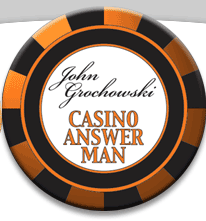As introductions go, "Craps. Short bankroll. Whaddya do?" wasn't the
smoothest I'd ever heard, but at least it was straight to the point. The
gentleman in the buffet line wanted to talk about craps.
I asked how he liked to play.
"If I could afford to play the way I like to play, I wouldn't have a
problem," he said brusquely. "I like to start on the pass line, then
follow it with two come bets until I have three numbers working, with
maximum odds on all of them."
That's one of the best ways to attack the game. Free odds, offered in
addition to pass and come bets, are paid at true odds and carry no
house edge. Backing the pass and come bets with free odds drops the
house edge below 1 percent, down to 0.8 percent with single odds, 0.6
percent with double odds, all the way down to 0.02 percent at casinos
that offer 100x odds --- if you can afford it.
"Afford it is the problem," he said, adding that he'd just walked
away from a table that offered 10x odds, which drop the house edge to
0.2 percent. "With the 10 times odds here, if I have a $10 pass bet and
two $10 come bets working, I could back each with $100 in free odds. Or I
could if I had more than 200 bucks in my pocket."
That could be a problem. Even with a much larger bankroll, putting
$330 on the table all at once, all of which could be wiped out by a
single 7, can be a wallet buster. If you're going to take advantage of
10x odds, you'd better be working with a bankroll in the thousands, not
the hundreds.
"Yep. I'm no fool. I don't bet the center-table propositions, or the
field, or the hardways, the stuff with the really high advantages for
the house. I don't place the 4 or 10, or the 5 or 9. I want the best
deal I can get.
But I can't get it without betting more."
If you're really smart, I told him, you know that betting more isn't
the answer if you can't afford it. The money to gamble has to come from
an entertainment budget, not from money you really need for the rent,
groceries, kids' schooling or other necessities of life.
"I know that. I've resigned myself to the fact I can't afford the
best deal at craps. The problem is, when I break it down, even taking
single odds is too rich for my blood. There are no $5 minimum tables in
this casino, and when I go to other casinos that do have 'em, they're
always packed to the gills. So I play at the $10 tables.
"If I have a $10 pass bet and two $10 come bets, and back them each
with single odds, I still have $60 out there at once. Let's face it.
That's too much that can go down the drain at one time, when I'm only
starting with $200."
I asked him what he'd considered doing to stay within his budget.
"The first thing I thought of was just to make a pass line bet, skip
the come bets, and back the pass bet with as much odds as I thought I
could afford. Even if I backed a pass bet with double odds, I'd have
only half as much money at risk as if I bet pass with two comes, and
single odds."
That's probably as good as you can do when it comes to narrowing the
house edge, I told him. You're down to 0.6 percent with pass backed by
double odds.
"Yeah, well, I tried it --- and it's boring. I can't stand having
only one number at a time. So I figure my real choice here is to either
bet pass followed by two come bets and no odds, or a pass bet followed
by place bets on 6 and 8 instead of the comes."
On a percentage basis, the pass with two comes is the better bet. The
house edge on pass, without free odds, is 1.41 percent. Come bets also
face a house edge of 1.41 percent. The house edge is a little higher on
the place bets on 6 and 8, at 1.52 percent.
"I know that, but given that I can't get the free odds, the
difference between come and the place bets is negligible. Especially
when it means that I always have the 6 and 8 going."
There is some comfort in having 6 and 8, the most frequently rolled
numbers other than 7, working for you. But besides having a slightly
lower house edge, there is another advantage for come bets over the
place numbers. On the average, it takes more rolls to settle a come bet
than to settle a place bet. That gives the house edge fewer
opportunities per hour to work against you.
My new-found friend sighed heavily.
"So that's what it comes down to. Fewer bets per hour to lower risk."
That may not be the best deal at craps. But it's as good a deal as the short-bankrolled player can afford.

No comments:
Post a Comment